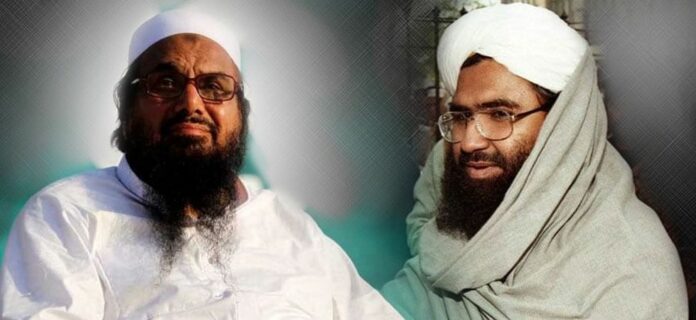Pakistani establishment is back to its old ways of banning its sponsored terrorist organisations whenever global financial watchdog is about to roar. Now also, as the four-month reprieve granted by Financial Action Task Force (FATF) nears its end, Pakistan is back to its old stratagem of putting few big names in terror behind bars and banning the global terrorist outfits. Pakistan has till date successfully avoided being put in black list by simply following this ritual.
The process of banning the terror outfits by Pakistan governments started since 2001 but hardly any concrete steps were taken to curb the violent menace. The reason is not difficult to find. The named outfits are renamed or merged or reshaped to relaunch themselves to attain their objectives.
According to Pakistani newspaper ‘The Dawn’, the latest addition to the list is Khatam-Ul-Ambia, which is an offshoot of Ansarul-Hussain. Interestingly, the latter was banned in the late 2016 for its alleged involvement in recruiting the youth from the Shia community to fight the militant Islamic State (IS) group commonly known as Daesh and renamed.
The process of maintaining a list of proscribed organisations started on Aug 14, 2001 when Lashkar-e-Jhangvi and Sipah-i-Mohammad Pakistan were outlawed. Later, the actions of Pakistan became stiffer as US pressure increased after 9/11. On Jan 14, 2002, the government banned Jaish-e-Mohammad, Lashkar-e-Taiba, Sipah-i-Sahaba Pakistan, Tehreek-i-Islami and Tehreek-i-Nifaz Shariat-i-Mohammadi.
Tehreek-i-Jafria Pakistan was put on the list on Jan 28, 2002, followed by Al Qaeda on March 17, 2003, Millat-i-Islamia Pakistan and Khuddamul Islam on Nov 15, 2003 and Islami Tehreek Pakistan on Nov 15, 2003. Three more organisations — Jamiatul Ansar, Jamiatul Furqan and Hizbut Tehrir — were banned on Nov 20, 2003 while Khair-un-Naas International Trust was proscribed on Oct 27, 2004. And so it continued, year after year.
The Pakistan government was able to find an opportunity in the global pressure and banned those outfits which were inimical to Pakistan. They were branded as terrorist organisations.
That list includes Balochistan Liberation Army and Islamic Students Movement of Pakistan. Lashkar-i-Islam, Ansarul Islam and Haji Namdar Group were banned in 2008 and Tehreek-i-Taliban Pakistan was outlawed the same year.
Five militant organisations from Balochistan — Balochistan Republican Army, Balochistan Liberation Front, Lashkar-i-Balochistan, Balochistan Liberation United Front and Balochistan Musallah Difa Tanzeem — were put on the list in 2010. Three organisations from Gilgit — Shia Tulaba Action Committee, Markaz Sabeel Organisation and Tanzeem Naujawanan-i-Ahle Sunnat — and Peoples Aman Committee (Lyari), Karachi, were placed on the list on October 10, 2011.
So, the decisive actions were initiated against these ‘terrorist’ outfits while the likes of Hafiz Saeeds, Lakhvis, Masood Azhars were treated with kid gloves.
Days after Pakistan banned JuD and FIF, both outfits underwent a name change, calling themselves “Al Madina” and “Aisar Foundation”, respectively, in order to remain active, according to a report by Pakistan’s Daily Times.
In India, among the 41 terrorist outfits banned by the Home Ministry, almost half are allegedly either based in or sponsored by Pakistan. Among these, some are observed to have re-emerged with a new name.
Nadeem ul Haque, a former senior resident representative of the International Monetary Fund (IMF) charged that Pakistan may have fulfilled other conditions imposed on the country by FATF, but the country has yet to really counter what he called “visible terrorists”.
“Pakistan is failing in catching the visible terrorists the world wants to catch. That seems to be the main problem. The rest of the conditions are virtually done,” Haque said.
James Schwemlein, an expert on South Asia at the Carnegie Endowment for International Peace, charges that Pakistan has taken only modest steps.
“So far, it appears the authorities have taken modest steps to meet FATF requirements, such as freezing banking accounts and seizing properties, but are far from full compliance,” Schwemlein said. “At this point, it does not appear that Pakistan has taken any irreversible step to improve its anti-money laundering and counter terror-financing regime.”
Schwemlein said Pakistan’s intelligence agency continues to maintain ties with militant groups.
The latest visit of Pakistani foreign Minister to China is construed as a pre-emptive step to seek Chinese help to secure itself out of black list.


